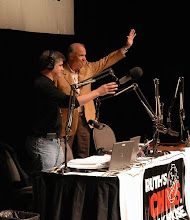The case of a bullied teenage girl who took her own life has grabbed attention across the U.S. The death of Phoebe Prince has resulted in the indictment of nine of her high school peers in the South Hadley , MA with additional indictments expected. The Prince case is intriguing not because its uniqueness, but because it is so common. The question is - why the media attention now for something that’s been going on for ages?
South Hadley has become a fish bowl with thousands of harpoon pointing fingers demanding retribution – fingers pointing away from the only real solution. Only by accepting personal responsibility can we heal and effect change in our own communities and homes. That's a solution. Pointing at the “monstrous” behavior of others and shoving the responsibility of a collective culture that perpetuates and condones bullying at all levels far away from our own doorstep accomplishes exactly two things: Perpetual Victimhood and Ethical Impotence.
How could I say this? Isn’t it easier to recall and recount gut wrenching incidents of being bullied in school?
Isn’t it also true too that none of us can escape a nagging memory of treating someone else unfairly? Of whispering cruelties? Of acting vengefully as a teenager? …and as adults?
Guilty.
So, now what?
Rather than concentrating venomous judgment on a community and school that is no different than our own, we model the change this country is demanding of South Hadley. We learn to understand the devastating effects of bullying, how to recognize it in our schools, our children and ourselves. We recognize that teenage girls are just as effective at bullying as teenage boys are, and some would argue, even more so. Culture driven mandates that “girls are supposed to be nice” have only served to redirect their aggression down avenues at times more torturous than the fist fights teenage boys openly engage in.
In “Odd Girl Out” and “Odd Girl Speaks Out” Rachel Simmons delves into female bullying, putting a face on an underground culture of girls’ abuse of girls. Simmons travels across the country speaking to girls, parents, teachers and coaches on female aggression, naming the demons and dragging them out into the light.
“Dirty looks, taunting notes, exclusion from social groups – there is a hidden culture of girls’ aggression in our schools that is as widespread as it is painful,” Simmons says. Through first person case studies, Simmons goes beyond anecdotal surface assumptions, sharing insights that parents, teachers and coaches can use to better guide young girls and young women.
Beyond the immediate symptom of bullying, MA based writer and artist Daniel Brown says teenagers need to be encouraged to acknowledge the disturbing thoughts that haunt them. “Young people should be encouraged to communicate the darker emotions that roil their minds instead of having them medicated or denied,” Brown suggested in a recent essay about the South Hadley incident. “Instead of embracing a dead-end culture of victimhood, we should give even the meekest of kids the mental and verbal tools that will teach them how to defend themselves when they are falsely accused or verbally assaulted.”
Joining with many others calling for a stop to the South Hadley “witch hunt,” Brown says adult modeling would go a long way towards showing young people appropriate ways of handling frustration, disagreements, jealousy and anger – all natural occurrences in social group settings. All too often teenagers witness their own parents engaged in similarly cruel and callous behaviors as those that reportedly led to Phoebe Prince’s suicide. Unintentional modeling is perpetuated by teenagers who view it – however aggressive, cruel and destructive – as an acceptable option.
The answer lies in our own homes and in our relationship with our own children. Humility and a willingness to recognize our own shortcomings…and being willing to talk about them is one simple first step. Pulling back the finger of accusation is the second.
(c) 2010 Shari Downhill









No comments:
Post a Comment